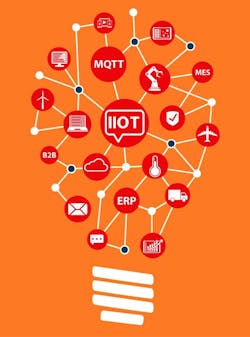IIoT: Game Changer or ‘Been There, Done That’?
Many people see IIoT as simply extending this pyramid further, fully realizing the “plant floor to top floor” scenario that we have all been promoting for years. Yes, IIoT can potentially add better management layers, especially for predictive maintenance and planning, and these factors alone may cost-justify an investment in IIoT strategies. Indeed, for many companies, this will be the starting point for IIoT, and probably a good thing because managing such a potentially disruptive inflexion point in the history of automation will need great care.
However, I think the disruption will alter the ways our machines interact. I expect the automation pyramid to change from being a vertical structure to a more horizontal one. Machines, systems and even production lines and businesses will become so highly decentralized and yet interconnected that our network architectures will morph into mesh systems. Machines and systems will become autonomous and have far greater flexibility. Some experts are even predicting that IIoT could usher in an era of mass-produced one-offs, among other developments.
If the Internet of Things can be defined as “connecting people, data, processes and things,” then the Industrial IoT adds machines and businesses to the equation. One of the main use cases for IIoT is the “social machine” where intelligent production is driven by network-based communication among all elements of manufacturing, machine-to-machine-to-human. This extends the automation pyramid from the work-piece (where the product being made is telling the machine how to make it) to the consumer value chain (what is the customer thinking about the product).
So what’s next? How can your application take advantage of all that the “Industrial Internet of Things” has to offer? At the Smart Industry Conference, Hilscher has teamed with PCN Technology and Rockwell Automation to share “Migration Strategies for Legacy Plant-floor Networks.” During this three-hour workshop, you’ll learn best practices for connecting existing automation systems and networks to the Industrial Internet. My colleagues and I will examine how modern networks and IIoT enable new capabilities that deliver business intelligence. This workshop takes place the afternoon before the two-day event. We will also be working with PCN Technology on a conference session that will provide a higher-level overview on bridging the IT/OT divide. So: Register today and join the revolution.
Armin Pühringer is the Business Development Manager at Hilscher in Hattersheim (near Frankfort), Germany. Mr. Pühringer joined Hilscher in 2010 and is currently responsible for managing Hilscher’s development strategy for the Industrial Internet of Things (IIoT) and Industry 4.0.


